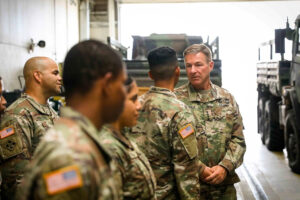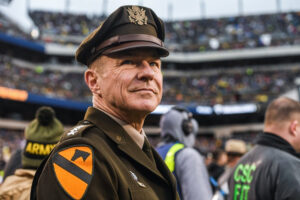Not only are people the Army’s No. 1 priority but, according to its top officer, they will also play a critical role in transforming the Army as it moves into the future.
“The time is now to transform how we take care of our people, our doctrine, our organizations, our training, our equipment, and how we compete around the world,” Chief of Staff of the Army Gen. James C. McConville said Oct. 14, 2020, during the Association of the U.S. Army Annual Meeting and Exposition.
It was McConville’s second time speaking at the meeting’s Eisenhower presentation. However, unlike previous years, there was no large in-person turnout. Also, no high-tech weapons or vehicles on display nearby.
Instead of flocking to the nation’s capital and brushing shoulders in the packed hallways of the Walter E. Washington Convention Center, the annual meeting went virtual to help mitigate the spread of COVID-19.
In his recorded remarks, the Army’s chief of staff took the opportunity to address modernization and readiness efforts, while primarily focusing on the force’s new top priority — its people.

“People first”
McConville has put “people first” since day one. On his first day as the 40th chief of staff of the Army last year, the four-star general vowed people would be his No. 1 priority. Not just Soldiers, but also their families, Army civilians, and Soldiers for Life.
During last year’s Eisenhower Luncheon, McConville discussed the Army’s various talent management upgrades, like how officers are selected for promotions, and announced one of his signature initiatives — the Army People Strategy. A year later, officials are still building onto those initiatives.
For McConville, “people first” is more than a tagline, “it’s a philosophy,” he said. “When we take care of our people and treat each other with dignity and respect, we will have a much stronger, and more committed Army.
“It’s always [been] people first,” he said. “People are our greatest strength and most important weapons system.”

Investing in people
McConville’s address came a day after Army Secretary Ryan D. McCarthy announced an action plan to prioritize the Army’s people and their teams.
“Just as we did with readiness, we must invest in people,” McCarthy said during the meeting’s opening ceremony Tuesday. “The time is now.”
Now with people as the Army’s top priority, McConville said the Army will “deliver on our readiness and modernization priorities. When we care about people, we get them in the right jobs at the right time, [and] that is how we win.”
To do that, the Army “must be ready — ready tonight and ready in the future,” McConville said. “No Soldier or unit will ever be sent into combat that’s not highly trained, disciplined, fit, and ready.”
The Army is at its highest rate of readiness, he touted, and it’s “because of the hard work of our people.” This accomplishment has lent a hand during a transformational time in the Army, as the service shifts from nearly two decades of investing resources into counter-insurgency operations to beefing up its arsenal against near-peer adversaries.
For years, other major players on the world’s stage, like China and Russia, have “aggressively invested in modernized technology and weapons systems” of their own, which has challenged America’s overmatch globally, he said.
As a result, “the time has come for transformational change to build the Army we need for the future, [because] winning matters. When the nation calls on the Army, we don’t go to participate. We don’t go to try hard, we go to win. There is no second place or honorable mention in combat.”
Looking back on the past year
It’s been a long year since his first Eisenhower address. In that time, the Army has “faced significant challenges around the world and at home,” McConville said, referring to conflicts in the Middle East and responding to COVID-19, natural disasters, and civil unrest.
Earlier this year, he said some 3,500 Soldiers from 1st Brigade, 82nd Airborne Division displayed a high level of readiness after completing a no-notice deployment to Iraq to protect U.S. forces and an American embassy.
Moving forward, the Army has a “unique opportunity” to plan for the future, McConville said. “Our nation’s competitors are more determined than ever to exert their will. That’s why the time is now to build the Army we need for the future. These are challenging times, but the great thing about challenging times is the opportunity to transform.”
Even amid the coronavirus pandemic, readiness efforts continue, he said. Right now, there are roughly 180,000 Soldiers in over 140 countries defending the United States.
“I am incredibly proud of our Army,” he said. “The performance of our National Guard, [Army] Reserve, and our active-duty forces this year has been phenomenal.”











